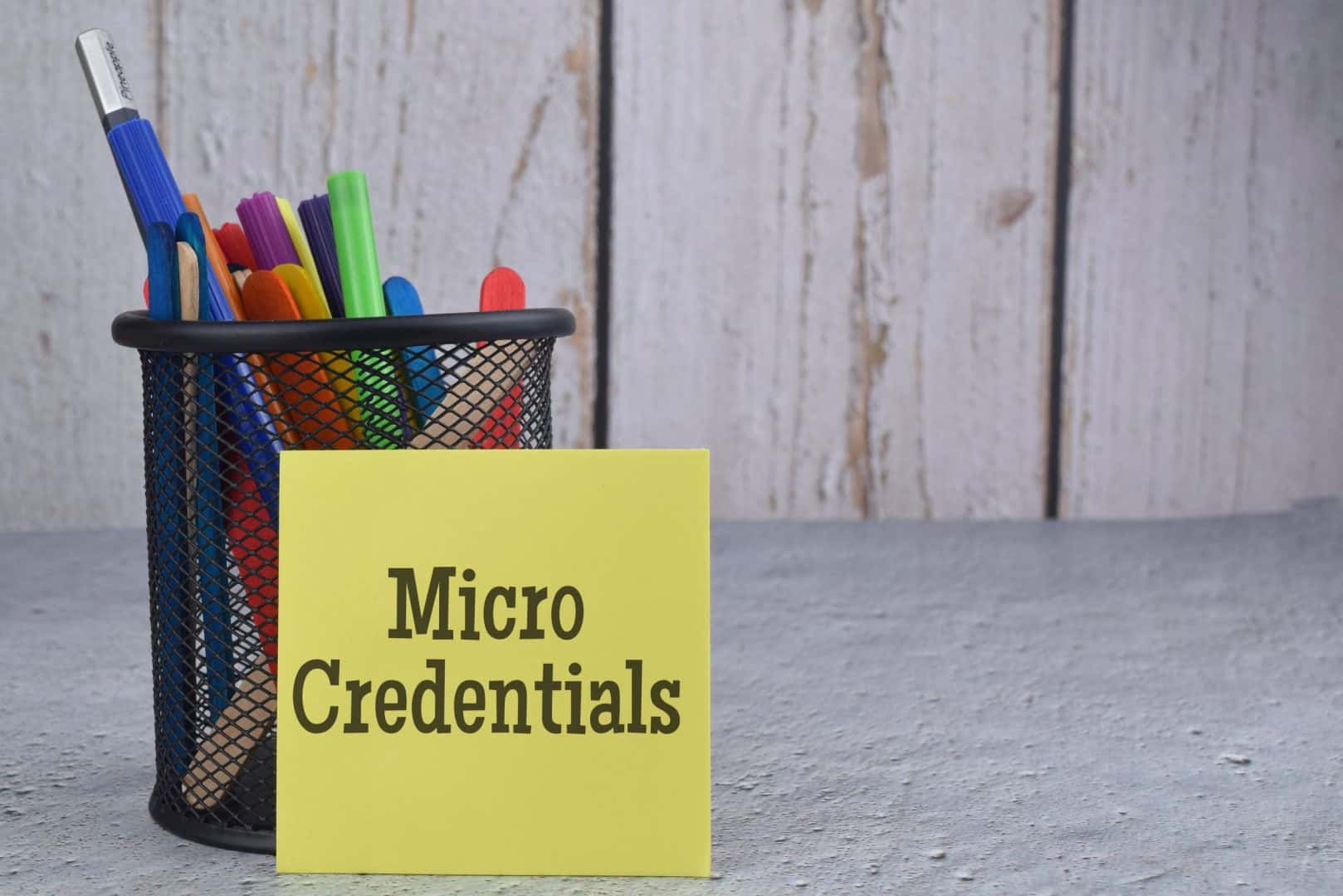Most professionals engage in some form of training every year. But the way this training is delivered and certified is changing. Yes, degrees and the like are still the most prized qualifications to stick on your resume. However, a more focused approach is called for as professional skills-based training increases in importance.
Welcome to micro-credentials.
Micro-credentials are short courses that focus on a specific skillset, such as data analytics or time management. Such topics are rarely broad enough to require two or three years of study. Instead, micro-credentials target the kind of skills and knowledge that professionals need to apply to their day-to-day work. Importantly, these courses result in some form of digital certification – hence the ‘credential’ – which can be used as evidence that the skill has been mastered.
They are often delivered online, although they can be delivered face-to-face too. They can be made up of assignments, lectures, elearning modules, assessments and all the other elements we traditionally associate with professional training programs. However, the certification of having completed the micro-credential is an integral part of the process. Certification should be provided digitally, so that the learner can easily prove their skillset to future employers as they make their way through their careers.
Many countries are embracing micro-credentials (MC). They can be defined as:
“MC is a term that encompasses various forms of certifications, including ‘nano-degrees’, ‘micro-masters’ credentials’, ‘certificates’, ‘badges’, ‘licenses’ and ‘endorsements’. As their name implies, micro-credentials focus on much smaller modules of learning than those covered in conventional academic awards, which often allow learners to complete the required work over a shorter period. In their most developed form, micro-credentials represent more than mere recognition of smaller modules of learning. They form part of a digital credentialing ecosystem, made possible by digital communications technologies establishing networks of interest through which people can share information about what a learner knows and can do (Milligan and Kennedy, in James et al., 2017).”
The MC outlined in the guide below primarily focuses on two important aspects:
- Digital attestation (digital badges, digital, nano degrees, micro degrees) which are secure and shareable.
- Records the achievement of learning of a specified set of outcomes (knowledge, skills, attitudes).
| Principle | Description |
|---|---|
| Relevance | The MCs should be designed to meet the needs of the learners, industry, and the community. They should be relevant to the needs of the 4th industrial revolution or personal development. Engagement with industries and employers is crucial to ensure currency, relevancy, and value of the MC. |
| Secure and Shareable | The MCs should ideally be based on technologies that preserve the identity of the learners and protect the certifications from misuse or alterations to ensure user trust. The MCs should be shareable across social media platforms via email, blogs, and resumes. |
| Transparent | The providers of MCs should furnish complete information on the units/modules/courses in a readable and easily accessible form covering course objectives, outcomes (knowledge, skills, and attitudes), mode of delivery, hours of learning (if applicable), content, assessments, credits etc. to the learners and other authorised users for purposes of evaluation and recognition. |
| Naming the Micro-credentials | MCs offered by any HEPs should be appropriately named based on the purpose, delivery, content, assessment, and scope. The titles should not in any way conflict with any qualification titles stipulated in the Malaysian Qualifications Framework. |
Here are the guidelines from the Malaysian Qualifications Agency (MQA) and how the Australian government is embracing micro-credentials for vocational education and training.
Why micro-credentials?
There are several compelling reasons why companies should consider using micro-credentials.
Training can be personalised for both employee and employer
They lend themselves very well to personalisation. Employees can train for a specific skillset in a way that focuses on what they require at the level they need it. Employers can also tailor their credentials to the needs of the company, so that courses improve performance and are closely aligned to business goals. They also enable managers to track the training of employees, so they can effectively assess skills gaps.
Increases motivation
Learners are most engaged when they feel computer based training will be genuinely beneficial to them. Micro-credentials fuel that engagement because they can be tailored to the job and invariably have a positive and immediate impact.
Recognises soft and hard skills
Employers and employees alike can keep track of individual progress as skills and knowledge increase. A formal recognition also establishes their importance. As a result, they are more likely to be taken seriously, especially if employees are able to use their digital certification in other organisations.
Supports life-long learning
Many companies these days put a premium on life-long learning, and some give employees responsibility to design their own learning journeys and area of study. Micro-credentials support this concept as training is needs-focused and enables people to build up skills as and when they want to.
Scalability
As courses tend to be short and geared towards a specific skill, they are easily transferable, too. Elearning and digital certificates are especially helpful in this regard. Well-designed online courses can be automated – either partially or fully – meaning you can roll them out to hundreds, if not thousands of people at a time.
This concept is very much in tune with the way we train today’s professionals. It’s a great way to track an individual’s progress over the course of their careers and helps businesses provide training that is relevant and useful.
Moodle is the perfect LMS to deliver micro-credentials. The platform is built to be highly personalised and interactive, and includes features that enable automated certification and assessment. If you would like to know more, do get in touch.

